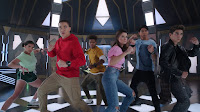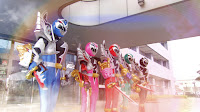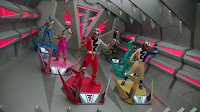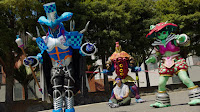65 million years ago, the evil Sporix Beasts ravaged the planet Rafkon before turning their attention towards Earth. They were pursued to our planet by six Rafkonian knights, who along with dinosaur partners were granted the power to become the Dino Fury Rangers by the Morphin' Masters – guardians of the Morphing Grid. After successfully capturing the Sporix, red ranger Zayto went into stasis to prevent their escape whilst the others were seemingly lost.
In the present day, a being known as Void Knight accidentally unleashes the Sporix whilst trying to steal and harness their power. Reawakened, Zayto must recruit a new team of rangers to fight once again. Joining him are paranormal-obsessed journalist Amelia, logic-driven scientist Ollie, competitive athlete Izzy as well as her stepbrother, free-spirited musician Javi. As their fight against Void Knight and the Sporix continues, they are also joined by Aiyon – a surviving member of Zayto's original team who was long presumed dead.
One thing that was striking about Beast Morphers was how continuity-minded it was – from more obvious things like the dino-themed crossover and RPM callbacks to the presence of past Ranger technology dotted around Grid Battleforce, it was clear that this next generation of Power Rangers aimed to take its rather messy conintuity and turn it into something more consistent. From the very first episode it's clear that the same can be said about Dino Fury, but this time there's an extra element of brand synergy to it. The appearance of the Morphin Masters, mystical deities that first appeared in the ongoing Boom! Studios comic series, shows a clear attempt at trying to bring these different mediums in line, though the end result works to mixed effect. Though a very convinient way of tying all the different iterations of the Power Rangers together through a common force, later revelations in the series perhaps make things a little too convenient. There's also a very fine line between making meaningful references and doing it just for the sake of it, and while Dino Fury certainly makes good attempts at the former it still falls back on the latter at times. For example – cameo appearances from Grid Battleforce help create the sense of a shared world even though the Beast Morphers cast are never integral to the story, but making a monster-of-the-week the nephew of Mighty Morphin's Lokar serves no real purpose other than a quick (and complete unearned) injection of nostalgia.
That all said, Dino Fury has plenty to offer as a standalone series too thanks to the steps it takes when it comes to world building. Whether it's making the city of Pine Ridge feel lively and populated or expanding on Rafkon lore, the show strives to make these places memorable. Featuring Zayto (and later Aiyon) as the survivors of a lost race instantly sparks an interest in their characters, with their efforts to recontact their home planet a recurring plot thread across both seasons. Unfortunately whilst Dino Fury is very good at setting up numerous plotlines, its insistence on having them all converge at roughly the same time proves to be a drawback later on. Rafkon comes and goes, and the interesting bit of tension the knights meet being reunited with their people is overlooked to progress other parts of the show's conclusion. Dino Fury is exceptionally good at tying all of its pieces together and making sure they matter in some way, but a little more time to let these elements breathe separaely wouldn't have gone amiss.
On top of strong storylines Dino Fury delivers when it comes to action sequences, maintaining a good balance between original and adapted footage. Power Rangers is always at its best when it has its own story to tell, and when it's doing that well it tends to be clear even if you're unfamiliar with the source Super Sentai. But if there's one area where the franchise is still severly lacking it's the sound direction. Dino Fury in particular has an amazing array of power ups with all the various Dino Knight Keys and modular Zord combinations, but they're brought down rather than bolstered by the same generic sound effects we've been hearing for years now. It doesn't even feel like a matter of consistency at this point – it just sucks all the uniqueness out of each individual team. Going back to the subject of zords, it was disappointing to see the series return the bland grey cockpits Power Rangers seems to use almost consistently now. Beast Morphers felt like a breath of fresh air in that regard, even if it was largely reusing Super Sentai footage for it.
Once again Dino Fury shows off an excellent team of Rangers, whose friendship not only shines onscreen but also in the various bits of promotion the actors have been involved in over the past few years. As (initially) the only alien on the team Zayto immediately stands out as the team's leader – guiding them through their new lives as Power Rangers. While Zayto often comes across as wiser and more level-headed than his teammates, even he isn't without flaw – his single-mindedness when it comes to finding Rafkon causing issues on more than one occasion. Pink Ranger Amelia's love of the paranormal makes for a fun character, especially with how it clashes with Blue Ranger Ollie's more scientific nature. This proves to be a lot of source for storylines in the early part of the series, and while their butting of heads creates a good dynamic between the two there are times where their stubbornness seems to go around in circles. Rounding them off are stepbrother/sister Izzy (Green) and Javi (Black), adding yet another interesting dynamic to the team. While the incessant banter that plagued the fight scenes of Samurai to Ninja Steel has thankfully been dialed back by this point, both in suit and out Izzy has some great quips and is just an immediately likeable character. By comparison Javi's personality isn't quite as big, but his passion for music makes him both relatable and enjoyable in his own right. Further into the series Aiyon proves to be another great addition to the team, his own Rafkonian heritage finally giving Zayto a little bit more to play off of as well as delve deeper into the history of both the Dino Fury Rangers and the Sporix. Though as skilled as Zayto, Aiyon's downfall is his impulsive nature – something that is constantly noted in episodes directly revolving around him. Again it's an unfortunate example of Dino Fury being able to create good drama and storylines based on a character flaw, but retreading similar ground each time rather than progressing the character properly.
Like the previous series Dino Fury also attempts to explore romantic relationships between the rangers - breaking new ground for the franchise when it comes to representation. Right from her debut Izzy stood out as one of the show’s strongest characters, but her reveal as the franchise’s first proper LGBT representation cemented her place in Ranger history. Just having that sort of representation in a live-action childrens’ show is commendable in itself, but Izzy’s relationship with Fern is so well done that it effortlessly becomes one of Dino Fury’s strongest storylines both on and offscreen. From its initial introduction all the way up until the tension created by Izzy having to balance her relationship with her superhero duties, their story is both engaging and treated with the utmost respect.
The fact Izzy and Fern's relationship is so well-handled makes it all the more surprising that Dino Fury fumbles its other big romantic subplot, particularly since as the pair in question are given considerably more screen time to develop. As previously mentioned the friendship between Amelia and Ollie is expanded upon nicely thanks to their dynamic, and although their differences in opinion sometimes felt reset after each episode ultimately the pair supported each other and any argument was eventually resolved. When the second season began to hint at romantic tension between the two, at first it seemed like a logical next step – episode 'Love Hate' is a highlight even among a particularly strong string of episodes. However once their relationship had been established, all of that energy that gave the pair engaging in the first place immediately lost. While the show moves onto more interesting things when it comes to Amelia as it explores the identity of her missing parents, it's a shame that Ollie (already one of the weaker links in the Dino Fury cast) had to be sacrificed in the process.
Proper world-building requires more than just places names and references though, and as such Dino Fury owes much of its success to the great job it does with its supporting cast and making Pine Ridge feel lived-in. Each of the core rangers has at least one significant other in terms of family, all of whom are brought into the main plot in some meaningful way. For Zayto this is far more straightforward, with cybernetic dinosaur Solon acting as the team’s mentor and technical support. As well as just being a great suit design that sits comfortably alongside the likes of SPD’s take on Doggie Kruger, Solon’s motherly nature is a unique spin on the traditional mentor role. Ollie’s mother Dr Lani also proves a key ally to the rangers, eventually becoming aware of their secret identities at the end of the first season. Park warden Carlos Garcia (Javi’s father/Izzy’s stepfather) is a slightly more curious case, feeling like he’s often played above his station like the writers didn’t want to include a more direct form of law enforcement in the show. While his involvement with the team tends to fall on the more civilian side of storylines, even he proves crucial to certain plot progressions as time moves on. Rounding off the family element is Amelia’s guardian Ed “Pop Pop” Jones, another character who turns out to be a lot more than he initially seems. Early appearances largely paint him as a comedic (yet rather endearing) character, however as his history is revealed he in turn proves a crucial part of Dino Fury’s own backstory. It’s touches like these that really make the series work - finding a key part for everyone no matter how significant they may be. Even comic relief characters Jane Fairview and her android assistant J-Borg, as silly as their appearances often are, have an important place in spearheading Buzz Blast - the internet media company where Amelia and Javi work and acts as a central hub for nearly everything that happens in the show.
This strong approach to characters and the need to make everything fit together also applies to the villains, whose story is very slowly teased out over the course of the series. Whereas many of the recent Power Rangers villains have been classic space aliens or monsters with goals of world domination, Dino Fury marks a return to far more personal motivations as Void Knight seeks the power of the Sporix to right a tragedy that has befallen him. In typical villain fashion he doesn't go about the right way, but when everything is finally revealed the story is able to make sense of why he didn't simply explain his actions in the first place. As the Knight was unmasked and Tarrick revealed the pieces slowly begin to fall into place, but when he finally reaches his end goal the tragedy simply continues. Santaura's introduction as Void Queen (and Tarrick's subsequent transformation to Void King) takes Dino Fury into more traditional territory as the villains' simply seek destruction, but the revenge angle still retains that element of tragedy. The use of Ressha Sentai ToQger's Madame Noir for the Void Queen suit is also an interesting little addition, highlighting Power Rangers' willingness to shop around different series for whatever suits the story best (as well as making things a little less predictable for Sentai fans). Though some elements become a little rushed as the series races to have all the pieces fit together by the finale, the overall picture of how Tarrick and Santuara relate to other characters in the series is both well-conceived and seen through to a satisfying conclusion. There's also a lot of fun to be had with Void Knight's army of Sporix beasts and robot generals, with Mucus proving to be another highlight in the show's strong cast. Much like her Super Sentai counterpart, her relationship with Slyther is particularly enjoyable and it's great to see that there's potential for both characters to reappear again in the future.
This strong approach to characters and the need to make everything fit together also applies to the villains, whose story is very slowly teased out over the course of the series. Whereas many of the recent Power Rangers villains have been classic space aliens or monsters with goals of world domination, Dino Fury marks a return to far more personal motivations as Void Knight seeks the power of the Sporix to right a tragedy that has befallen him. In typical villain fashion he doesn't go about the right way, but when everything is finally revealed the story is able to make sense of why he didn't simply explain his actions in the first place. As the Knight was unmasked and Tarrick revealed the pieces slowly begin to fall into place, but when he finally reaches his end goal the tragedy simply continues. Santaura's introduction as Void Queen (and Tarrick's subsequent transformation to Void King) takes Dino Fury into more traditional territory as the villains' simply seek destruction, but the revenge angle still retains that element of tragedy. The use of Ressha Sentai ToQger's Madame Noir for the Void Queen suit is also an interesting little addition, highlighting Power Rangers' willingness to shop around different series for whatever suits the story best (as well as making things a little less predictable for Sentai fans). Though some elements become a little rushed as the series races to have all the pieces fit together by the finale, the overall picture of how Tarrick and Santuara relate to other characters in the series is both well-conceived and seen through to a satisfying conclusion. There's also a lot of fun to be had with Void Knight's army of Sporix beasts and robot generals, with Mucus proving to be another highlight in the show's strong cast. Much like her Super Sentai counterpart, her relationship with Slyther is particularly enjoyable and it's great to see that there's potential for both characters to reappear again in the future.
Which brings us rather neatly onto the return of Lord Zedd, whose unrelenting evil acts as the perfect foil to the more tragic villainy of Tarrick and Santuara. While the grand revival of the self-proclaimed 'Emperor of Evil' and debatably Power Rangers' greatest villain should seem like a huge moment for the series, instead it feels like one instance where its sense of nostalgia might be misplaced – instead highlighting a hesitance to truly move forward. Though technically a similar argument could be made about Evox' reveal as RPM's Venjix in Beast Morphers, at least that it was a story that had been deliberately (and somewhat painfully) left open. For better or for worse Zedd's story was done – and the fact this version is introduced as a time displaced version "from when he was at his most evil" feels almost like an acknowledgement of this. But beyond the wider implications of Zedd's return, the fact remains that the character just isn't very interesting here. The newly designed suit may be impressively imposing, but Andrew Laing's portrayal feels so far removed from Robert Axelrod's that it can be hard to reconcile the two. While there is a joy to seeing Lord Zedd out in the field and fighting the rangers himself, this version just doesn't have the same gravitas – often coming across as a recurring general rather than the villain that once had to be toned down after parents complained he was too frightening. What should have been big moments for the series (such as Rafkon’s rediscovery) feel unfairly attributed to Zedd in an attempt to make him a bigger presence but fall flat because he just doesn’t feel like a part of Dino Fury’s DNA. What’s actually far more exciting is the return of Scrozzle as his new right-hand man, who made a suitably strong impression in Beast Morphers and thus in turn still has plenty left to offer. Ultimately Zedd's return here is simply a taste of things to come as the final episode suggests further plans for the villain, so there's still a chance that it could develop into something a little more interesting once he isn't stealing the spotlight from someone else.
Following in Beast Morphers’ footsteps, Power Rangers Dino Fury represents something the franchise has desperately needed for a long time – a clear vision for the future. Though it perhaps makes a few missteps along the way, the series makes an earnest attempt to embed itself in the complicated web of Power Rangers continuity with both links to the past and hints toward the future. However at the same time it's also able to stand comfortably on its own, utilising a strong team of characters played by a cast who have a clear passion for the series. With Power Rangers Cosmic Fury taking the interesting direction of being both a direct sequel AND featuring newly created suit designs and footage (alongside Zord footage from Uchu Sentai Kyuranger), the future of Power Rangers may seem uncertain but it's the most exciting it has been in years.


















1 comment:
Not sure I agree with everything.
Post a Comment